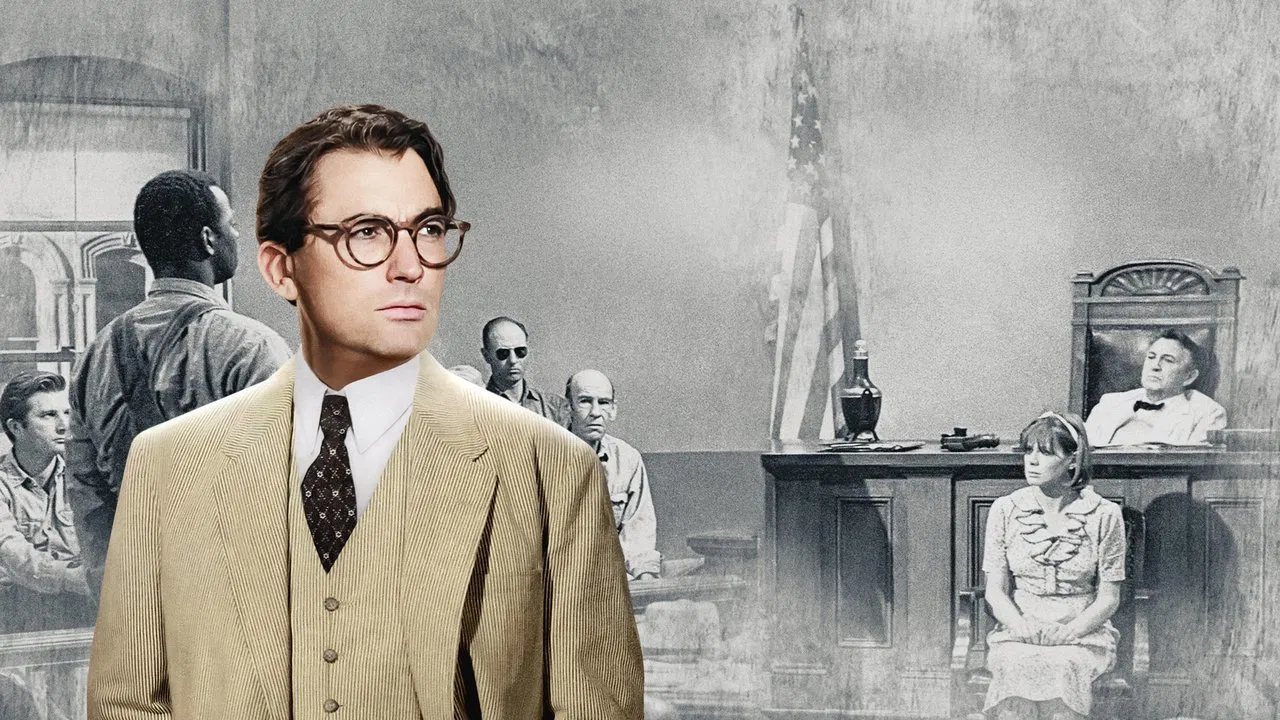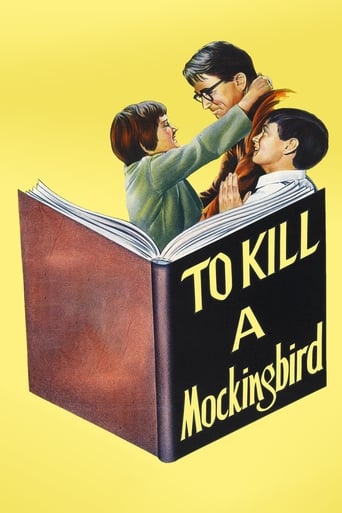

'To Kill A Mockingbird (1962)' has held up remarkably well over the years, perhaps most due to its faithful representation of Harper Lee's timeless source novel. It boasts brilliant performances - including surprisingly good turns from the first-time child actors - and beautifully crisp black-and-white cinematography. While the movie isn't quite as successful as the book, as usually is the case, it's still an enjoyable tale that acts as an important and enduring cry against prejudice in all its forms. 8/10
... View MoreThe most beautiful thing about To Kill a Mockingbird is undoubtfully the cinematography. Shot in black and white, this masterpiece in film noir looks absolutely gorgious. Debt and shadows, compositions and sharpness, I watched in awe.As for the story, in my opinion it took too long before the black man drama began, and it wasn't very good embedded in the movie. The acting is superb, by all members of the cast. I've never seen such a loving father for his children, very moving. Yet, the subject of racial discrimination addressed in the early 1960s is something ashonishing. Robert Mulligan has been extrememly brave to put the novel into a movie. That's what makes this movie American history.
... View MoreI just finished watching this movie and I wish I could get those 2 hours back, somehow. I'm a screenwriter and I have to admit that after viewing this "scramble", I'd like to spend some time trying to fix it, but I'm afraid that it would take way too much time. My favor character was by far, Scout! She has so much spunk and stands up for herself as I'd want my daughter to do. Mr. Atticka Finch was indeed a southern gentleman and a great lawyer. Unfortunately, in that time and place, (which I grew up in) there was no way a Black man would have won that case. So that much was sadly real and true. The court action started well, but fell apart because it was way too long. I can believe that they took Tom to a different location for his safety and murdered him. That was a common practice in the south. But what happened to the kids in the woods coming home at night was totally confusing. And who was the white man hiding behind the door after the fact? Who exactly was he supposed to be? This movie was very poorly done and I would not recommend it to anyone, even my worst enemy. I hate it when I have more questions about a movie while the end credits are rolling. Don't waste your time.
... View MoreTO KILL A MOCKINGBIRD is a crime drama about family love, racial intolerance, ignorance, playfulness and acceptance in the difficult times after the Great Depression. Film is based on Harper Lee's 1960 novel of the same name.The two young protagonists are brother and sister, who lives in a fictional town in Alabama. The story covers three years, during which, they undergo changes in their lives. They begin as innocent children, who spend their days happily playing games while imagining a subject of their lush imagination. The children's widowed father is a town lawyer and has strong beliefs that all people are to be treated fairly. However, the racism and evil in their city are exacerbated by poverty. The children's need to grow up very quickly. A local judge appoints their father to defend a black man, against an accusation of rape of a poor white girl. Their father accepts the case, that will stir up passions in the entire city. The children's will finally meet their Mockingbird...This emotional story is full of innocence, positive energy and charm. The young protagonists are like drifters on the street, which are trying to play relentlessly in a very dangerous world. An excellent cinematography takes us into a mystical world of the American South. Everything is very close, and yet, everything is so far in that world. This is not a strong human or courtroom drama. The magic is present in those little moments that change our everyday lives. That magic is visible through the voice of a young girl, the smell of ripe melons, laziness of the summer heat, wind that sways a swing on a porch and a friendly face in the night. Mr. Mulligan has added these segments in a line with the social crisis in a community. A man, as an individual, is completely helpless in this melodrama.Plots are constantly alternating, so we can think that their social whirl does not have its place. The consciousness about good and evil is a part of a harsh knowledge in the eyes of two young children. Mr. Mulligan has balanced this story between children's fetches and serious themes. The essence is in the relationship between a father and his children. This story did not show, in a credible way, trouble with growing up, first encounters with evil people and situations in a society that is far from an ideal. But those are minor shortcomings in it.Characterization is excellent.Gregory Peck as Atticus Finch is the embodiment of a tolerance, compassion, understanding and courage. Mr. Peck has offered a convincing performance. John Megna (Charles Baker "Dill" Harris), Mary Badham (Jean Louise "Scout" Finch) and Phillip Alford (Jeremy Atticus "Jem" Finch) were excellent, along with the fact that little Mary has definitely stole the show as a curious girl.Brock Peters as Tom Robinson was impressive in a small, but very significant role. He is like an injured beast, which is aware of the fact that no one will be able to save her. Robert Duvall as Arthur "Boo" Radley is an invisible monster and fallen angel at the same time. His character has contributed to the strong finale of this film.Everyone has, given the time and place, met a Mockingbird.
... View More